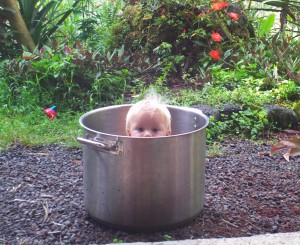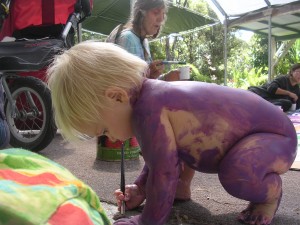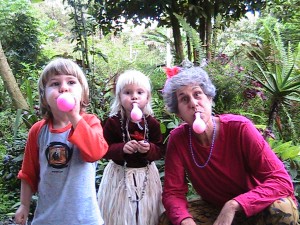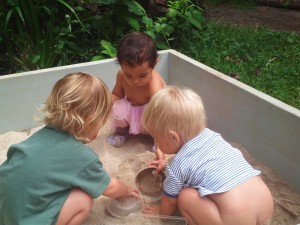 Children are an integral part of community life at La’akea.
Children are an integral part of community life at La’akea.
We appreciate and recognize the benefits and challenges involved in conscious childcare. While the parents are primarily responsible, other members, and the community as a whole, participate in caring for the children.
We are currently open to the possibility of adding more children to our community with their families.
The two children who grew up at La’akea Community attended the Malamalama Waldorf School. The Waldorf School is a private school, which allows them to focus on the whole child and their natural development patterns.
We were fortunate that their teacher was a very experienced Waldorf teacher who raised her children much the same as our kids were raised here – off the grid and supported by friends, family and nature. Those children are now teenagers, and we currently have one young child living here, born in 2018.
Policies About CHILD RAISING AT LA’AKEA
We aim to act in these ways as much as possible around the children we care for, and to support each other to do so:
We value them as important members of the community.
We aim to have adults care taking the children who want to be with them in that moment, and have good energy for them. If you are caring for one of our children and are frustrated please ask for support.
We support and encourage adults to spend one on one special time with each child as they are available.
We involve the young person in all decisions about their life when possible.
Explain to the children what is happening when they are curious.
Look for ways that we can empower them rather than do things for them. Find ways to have them help in everyday tasks and activities.
Include them in conversations when in a group, and ask their opinions respectfully.
Listen with respect when a child acts powerfully and says what they think, even if you do not agree with their ideas. Especially respect their feelings, even if they seem to be silly or irrational to you. Children will often react strongly to something that is relatively minor, as an “excuse” to express and unload deeper feelings of real hurts.
We treat our children as important, intelligent human beings and avoid the tendency to demean, discount, disrespect or ridicule them.
When the children are around we include them in our conversations about them. If we need to discuss opinions about our children, we do so in their absence.
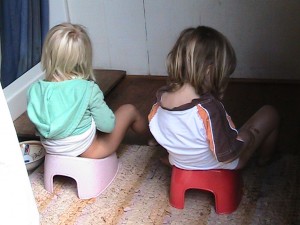 COMMUNICATING WITH THE CHILDREN
COMMUNICATING WITH THE CHILDREN
We value honesty and transparency in our communications.
One communication tool that we use is Non-Violent Communication. This includes making an observation about what is happening, saying how we feel about it, what our needs are and what we would like to request.
Example: “When you stand on that chair, I feel afraid. I need you to be safe. Would you be willing to come down?”
We avoid condescending, cooing “baby talk.” We talk to them like normal adult people, in words they can understand.
We like to listen closely. We avoid interrupting, advising, or directing the conversation when they are expressing their ideas and feelings, unless we need to provide limits to their behavior.
Lots of eye contact and physical contact is important to feel connected.
We check in with them a lot and let them change their minds about what they want moment to moment.
We communicate to them when a transition is about to happen. Like “Let’s finish the bath in a couple of minutes, and go to dinner.” “This is the last book, then we will go to sleep.”
We want to create safety in the child’s play. We let them explore and challenge their physical skills so they can learn.
We enjoy hugging and physical play. Touch children only when they want to be touched, (except as needed for safety or limit setting) and encourage them to do the same with each other.
Nudity is accepted in our community.
LISTENING TO THE CHILDREN’S FEELINGS (counseling them)
The young people may act out and ask for attention. All acting out is a request for attention so the child can release hurts. No one acts “bratty” for the fun of it, or asks for more attention than they really need. They just need a lot!
The child always deserves attention. But we may not have it at that moment, and it may not be possible to find another adult to help. If we can give them attention, often even a few minutes can make a dramatic difference. If we can’t, we explain why and tell them when we will be able to listen later.
It is important for the children to have information about what is real for us. It is better not to try to counsel them if you are really upset with your own feelings.
They may need to be angry, rebellious, clingy, frightened, selfish, sad or disrespectful. They need times when it is OK to express these without being shamed. Not every situation is appropriate for the expression of feelings. The child may be asked to wait or to be taken away from activities.
We give them lots of empathy and understanding, love and touch if they want it. Give them empathy if they are acting out by repeating what you hear them say, expressing your needs and then negotiating with them.
If a child hurts themselves, we take a moment to give them full attention while they have their feelings about it and tell the story.
Children need rational limits in order to feel safe. They have a right to feel the angry, hurt and powerless feelings about the limits we set. Giving them the chance to fully release the feelings will quickly lead to them being able to accept the limit gracefully. We can give clear limits without disrepecting them or taking their power.
Non violence is very important- we never hit or spank the children. We may need to use physical restraint to keep them from hurting themselves, objects or other people, and we try to use words and requests first. There is always a better way than force to get a small person, who is totally dependent on us, to cooperate. Usually they just need to have situation respectfully explained to them, or get to counseled.
We validate their feelings (“I know, you really wanted that…you are really mad”) but remain firm and restate the limit calmly. We avoid telling them they don’t need to cry or feel their feelings.
We prefer to state what we want the children to do rather that saying what we don’t want them to do. For example, “Let’s leave the page in the book so we can read it again later”. Rather than; “Don’t rip the page out”.
We give them ample warning when you are about to give them a consequence for an unacceptable behavior, unless safety is a factor. First, ask them to change whatever they are doing once or twice. If they refuse, tell them why you need them to change, and give them a choice of other actions they could do. If they continue to not cooperate, tell them what the consequence will be, and be sure to follow through with what you said.
A useful consequence is taking them away from the other people for a counseling time, or taking away some desired object, food or activity. Usually the child will need to express their feelings about the consequence, and it is best to stay near them and listen if possible, rather that completely isolating them in another room.
Avoid giving them something they are asking for in a demanding, whiney or screaming way. Have them ask you for it in a calm way. If they are not able to do this, they need to express some feelings first. Giving in to a demand teaches them that this is a successful way of getting their desires met.
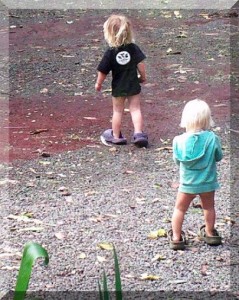 If the children are hurting each other like biting or hitting, separate them and tend to the child who has been hurt, letting them express their pain. If possible have another person (not the child’s parents) take aside the child who has done the hurting and tell them it is not OK, we do not treat people we love that way. Ask the child what is hurting them, that would make them want to hurt someone else.
If the children are hurting each other like biting or hitting, separate them and tend to the child who has been hurt, letting them express their pain. If possible have another person (not the child’s parents) take aside the child who has done the hurting and tell them it is not OK, we do not treat people we love that way. Ask the child what is hurting them, that would make them want to hurt someone else.
PLAYING WITH CHILDREN
We like to make a physical space that provides a lot of freedom, so the children do not have to hear “no” as often.
We like giving them the power to lead the play. (Of course, interrupt them if they are being destructive or hurtful)
We let them win whenever possible in the games.
We want to be involved in the play, not just sitting and watching them play. Build with the blocks, wrestle and run around with them.
Help teach them social skills with each other by helping them in taking turns, sharing toys, using words rather than physical grabbing or shoving, etc.
Toys at the main house are shared in common.
SAFETY
Stay in tune to dangers in the environment: CARS, TOOLS, TOXIC SUBSTANCES, SMALL OBJECTS THAT A CHILD COULD CHOKE ON (nuts, seeds).
NUTRITION
Consult parents before sharing sugary snacks or processed foods.
CHILDREN’S EFFECTS ON OTHER COMMUNITY MEMBERS
How children affect the adult members of La’akea is important to us. We encourage the adults to be in touch with their feelings regarding the children, determine what the adult’s needs are, and make requests around their needs.

